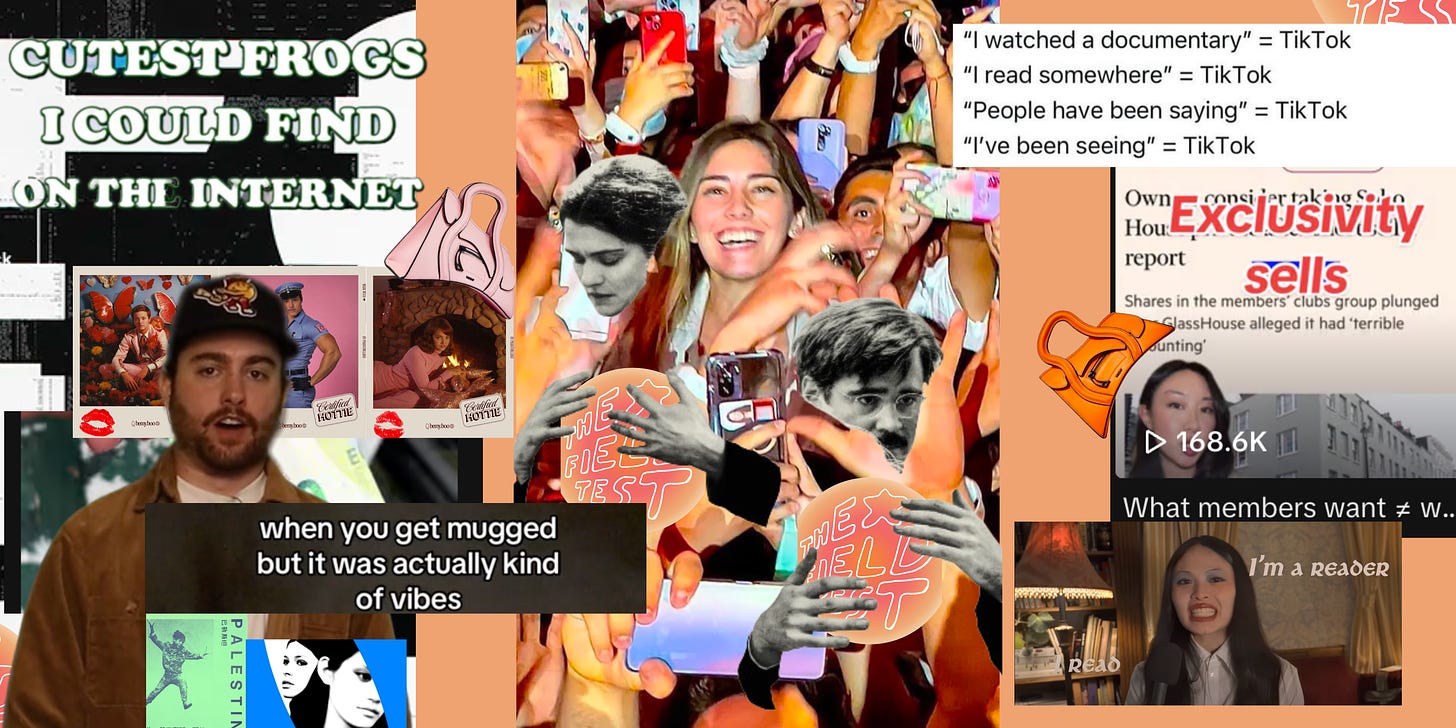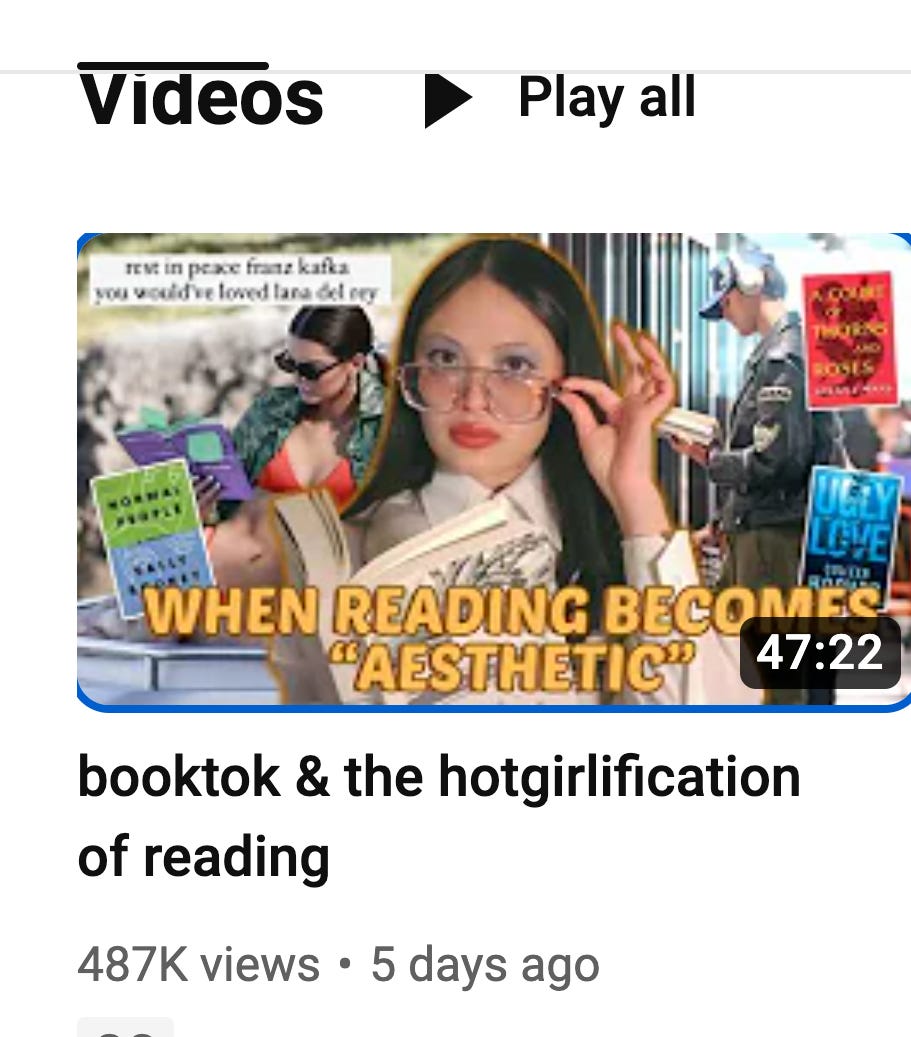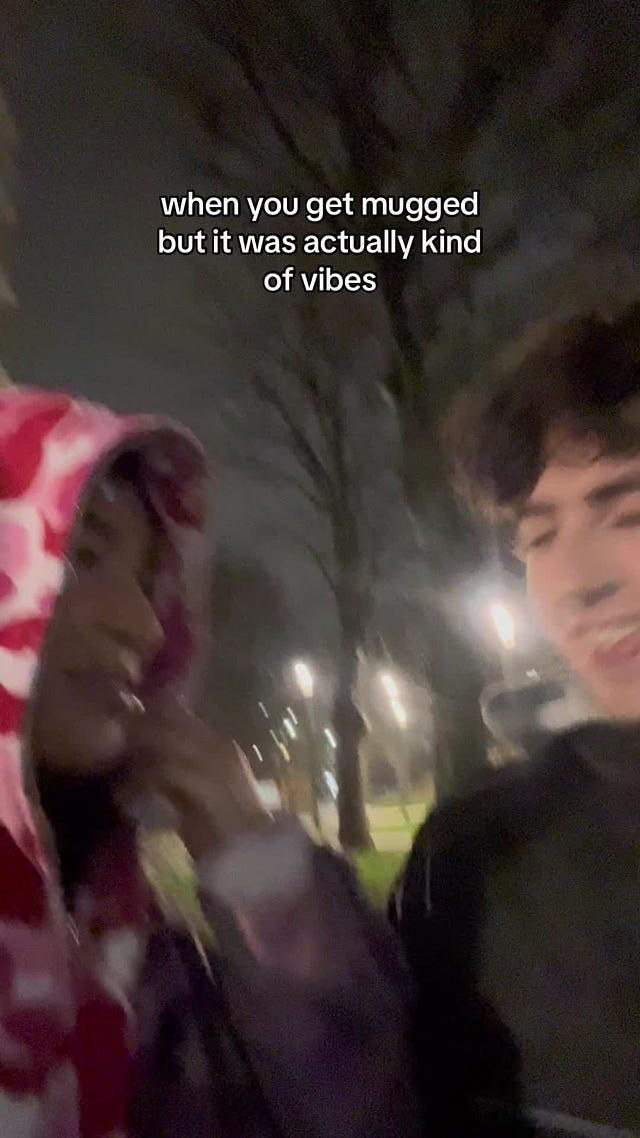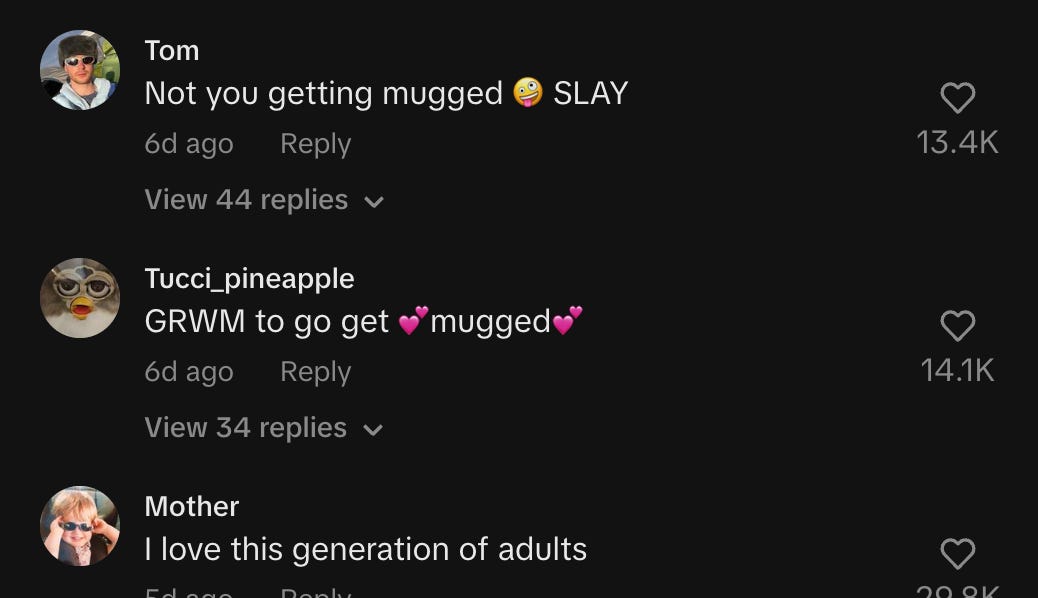When I started this issue three weeks ago, I felt quite happy with myself, because I felt like I’m finally back into the groove with my newsletter. But even with my best efforts of planning and scheduling posts, I struggled with inspiration. Even as I finish writing up now (21.54pm 21 Feb - day before posting), I have a gnawing doubt. i STILL feel like maybe I have nothing. Whatever it is - imposter syndrome, inadequacy, S.A.D? something is going around.
This feeling of creative burnout resonates a lot with what i’ve been reading in the last weeks, and has thankfully inspired the topic of this issue: burning out from digital behaviour, the plight of (average) internet culture, and good old algorithms.
(enjoy this song while reading!)
“The internet has made it so that no matter who you are or what you do — from nine-to-five middle managers to astronauts to house cleaners — you cannot escape the tyranny of the personal brand.”
(1) burning out from the algorithm
One in particular from vox talks in depth about how people are burning out from building our personal brand, and here are some TL;DR notes:
(1) personal brand: artists that have a ‘built-in’ audience are preferred when it comes to which art to publish/ promote etc. but the building of a personal brand requires constant effort and (some) existing social media knowledge of a consistent posting strategy, navigating the changing algorithms as well as the amount of trends. which ultimately takes away time from focusing on the art making itself because of having to find your own ‘brand’.
(2) commodifying creativity: there is an increase amount of pressure on artists - or just maybe anyone who wants a side hustle to become more financially economical - to also take on the role of entrepreneur, creator, manager, promoter. Art critics are also losing out, as more and more people get laid off, and ytbers / influencers take on the mantle without so much focus on proper critique or fact checking, critical thinking etc. it’s a dizzying spiral.
(3) marketing v art: all this means is that what we produce - the art itself - is affected. Social media moves at such a fast pace that you need to make sure you’re marketing yourself always. and as a result, the art itself is not the thing thats being worked on. ““It genuinely feels like I’m clocking into work,” she [Bethany Cosentino] says of social media. In the lead-up to her latest record, released this summer, she says she was online for hours from the moment she woke up, using an Excel spreadsheet to keep track of what she needed to post.” Also as we become reliant on the algorithm, we cant forget that these algorithmic challenges also has a bias against minority people, people with different abilities, people who don’t have access to technology and the list goes on.
(2) booktok and homogenization of culture
Interestingly, I watched my first video essay: Mina Le’s new video “booktok & the hotgirlification of reading”* which gave insight into the role of algorithms on booktok as well as explores how particular books become popular:
(a) mass appeal. I.e. Colleen hoover (@21.46 of Mina’s video), a famous booktok author was able to sell 14.3M books through tiktok (2022). And why? “It’s like comfort eating” - her books cover broad themes of romance making them easy to digest, read and like. Her novels have also divided people as to their popularity (read more about the controversy here).
and (b) the aestheticization of books. As aesthetic seeps into every part of our personality, books are not exempt from this. On booktok, the books you readcontribute to our digital identity. Take the CoHos (Colleen Hoover lovers), whose devotion to her books let them be #sadgirl for a little bit. Of course! Sometimes we need to be sad babies - THATS OK! Other aesthetics include dark academia books like Secret History by Donna Tart, and for the Coquette-girlies: Lolita, Virgin Suicides etc. But Le underlines the potential downside of readers of attaching their identity to one type of book genre: by doing so we limit our engagement with broader literary landscapes - which helps to cultivate critical thinking.
(3) beyond booktok
Of course, these issues also exist outside of booktok. For music, RA recently discussed how streaming has changed how we find music, how we decide which music we like, “The algorithm promotes the widest possible average”. The Rolling Stones explored how younger producers are approaching music by prioritising speed and mass appeal over artistic innovation. Which again highlights the conflict between artistic integrity and the demands of commercial success. But as Mina says, nowadays “You don’t have to be well liked by critics, to be well liked by the public”.
Beyond all these subcultures, we are all feeling burned out, not by selling out, by the general aesthetic culture. The keeping up with aesthetic trends, whether its through books, music or clothes, “You are not allowing yourself to be you, and instead putting pressure on yourself to deliver and hit an aesthetic’s expectations, which means you are likely to be constantly 'doing' rather than 'being'.” Our ability to curate unique tastes, a personality is getting affected by the algorithm.
the question remains: what kind of art, stories, and music will we see dominating popular culture? With algorithms shaping what gets seen and heard, as we’ve heard again and again - everything is just the same. The incessant cycle of being recommended what’s “trendy” or “hype” or “cultural capital”, by democratised influencers, to audiences that chase fleeting trends to adopt an equally trending new persona (mob wife, clean girl etc). And the speed of all of it, leaves us with shallow experiences instead of meaningful connections with art, and then with each other.
I also do not have an answer to the question. But I can imagine one of the reasons I have been feeling low, is because of this cycle: who to be, what to read, what to buy. And to bring it back to something I do know, I realise that I rarely like what people tell me to read. Instead, the books that I choose and spend time researching the author, the ones whose name spends ages in my notes apps before I finally buy them… those are the ones that I end up enjoying the most.
[In general, a lot of this is echoed by Kyle Chayka in his book Filterworld. And Rob Engelsmen (author of rise of anti-curation) also explores the age of soloculture in 4 parts in his newsletter.]
what do youuu think?
before the field notes here is my favourite video of the last weeks:
 Tiktok failed to load.
Tiktok failed to load.Enable 3rd party cookies or use another browser
field notes
reading. So I’ve started reading August Blue, Deborah Levy’s new book about a pianist whose parasocial relationship with someone she sees once in Athens, helps her understand a bit more. Which made me think of a video I just saw last night about how when you have a crush are you just in love with yourself? Because you’re projecting yourself onto them in your mind… An interesting review of Kyle Chayka’s Filterworld, and another here. This essay, about escaping to Sala Besar surprised me. One because sometimes I subscribe to so many things in my email I don’t remember why I’ve done so. which led to Two because turns out it was about Malaysia, and Three because it made me feel a certain way about home, about wanting to go away. An essay about Kant’s definition of work, which will make you question purpose, art and of course werk. Also a text about the many many temu ads aired during the Super Bowl, and moms - I AGREE (except for the fact that I’m pretty sure temu is not sustainable). Also, a piece about how we feel when we look at art using rothko as an example. Great piece on how the laundry chair is okay! “The stack on the chair isn’t only an indicator that she has other priorities — she’s actually come to find it helpful.” Funnily also this story about fake or forged Basquiats paintings is interesting to read in the context of the above discussion of critics. the article itself reads like the tv show White Collar, or Leverage with the investigations of art theft and forgeries. Also includes a cool insight about the west v eastern view of fakes and originals.
culture. for the Soho house people, news about how the group plans to take themselves private because shares in the group dropped because of ‘terrible accounting’. Ultimately the problem lies in the tension between investors who want to make more money, and the members who want to invest in the exclusivity of the existing community. AlSooo Omy goodness I found this video, and it is so random BUT SO cute, and i bumped into it by accident and WOW. I hope it makes you smile. for my people living in the netherlands, there is a creator leaving notes of money in random places in amsterdam. not like fivers either. but full hundies. Let me know if you find any. Also, here are ethan hawke and julie deply being cute on the set of before midnight. batman plays christian bale. beep beep ribby ribby. and one thing about the dune premiere, why is it that white women can wear things that look like the hijab (see comments) and call it fashion, but governments can still tell muslim women they can’t wear their religious dressing? I’m tired of this narrative. make it make sense. Also on the topic of algorithms, its funny because i think my algorithm wants me to start reading Dostoevsky, because i keep getting videos like “why you should read dostoevsky”. but lets be honest wont that make me feel even more inadequate. MSCHF launched their newest bag called the “global supply chain telephone bag” (GSCTB) to make a statement about consumer culture and challenge our notions of value, authenticity and style. The project involved sending confusing briefs to factories across four countries to create a “frankenstein” bag. and lastly, another random creator who has started posting her marking her child students papers, and for some reason this video has 97M views (at time of writing).
watching. oh wow I am obsessed with donald glover aka childish gambino’s new show Mr and Mrs Smith. This article talks about the “low key pleasures” of the show. The first episode was a bit slow, but i was immediately hooked. Also that HOUSE! wow. I have always wanted to be a spy! I cant stop thinking about it. I watched the lobster. And I really enjoyed it! I watched the marvels film, which was probably more bizarre than the lobster because with yargos you’d expect that, but with the marvels at one point i was very confused. There was a fever dream of color and I had to double check that I wasn’t watching a Disney musical. The end credits were shocking but end credits have apparently lots it magic because of all the confusion. Also something is in the air but I sad girl cried to aftersun and the worst person in the world. A little more about Mina Le’s video*, it looks at the current tensions of anti-intellectualism and readers and booktok and pretentiousness. I am in awe of people who can make video essays, and how they can present their thoughts so well, so engagingly. I could never really get into them before because of their length, but I’m really happy I did. When referring to how ebooks never managed to replace physical books as we thought they would, she says, “digital texts did not serve as markers of cultural capital or cultural distinction”, which i think is really the crux of the booktok discussion - how books have evolved to become cultural capital, part of an aesthetic.
palestine. Nicki Kattoura (palestinian writer) essay on writing during a genocide. Does Israel have the right to defend itself? Noam Youngrak Son makes an overlay tool so people can visualise the scale of the ongoing genocide. Where should palestinians go after Rafah? In amsterdam, every wednesday at 3pm on radioalhara, a group of people will read from books and texts written by palestinian authors or about the history. Heroes of Gaza. A 15 year old is using wind energy to lighting up shelters. What is modern zionism. Palestinian singer Nemahsis used her voice to raise awareness about the palestinian struggle.







